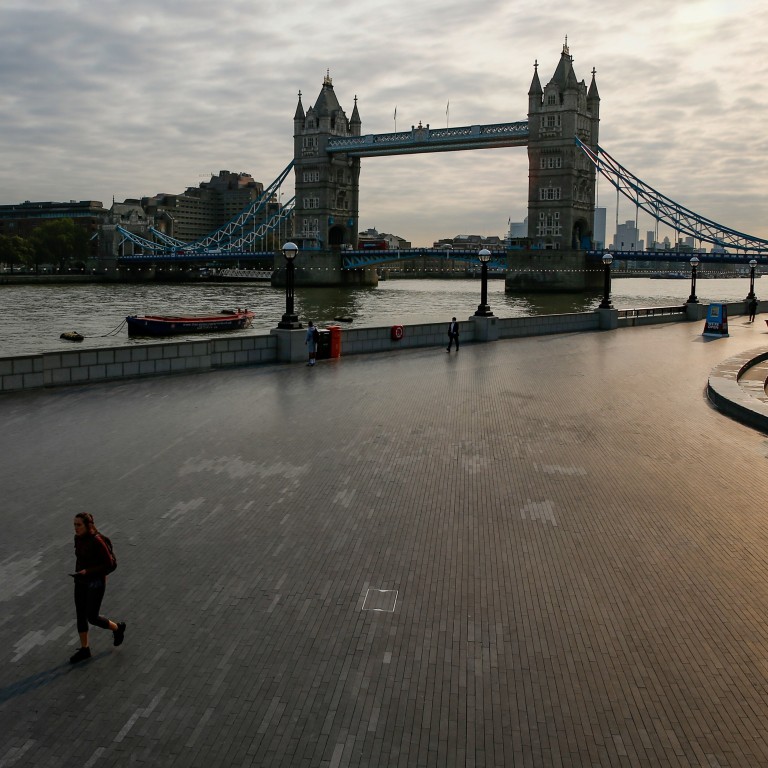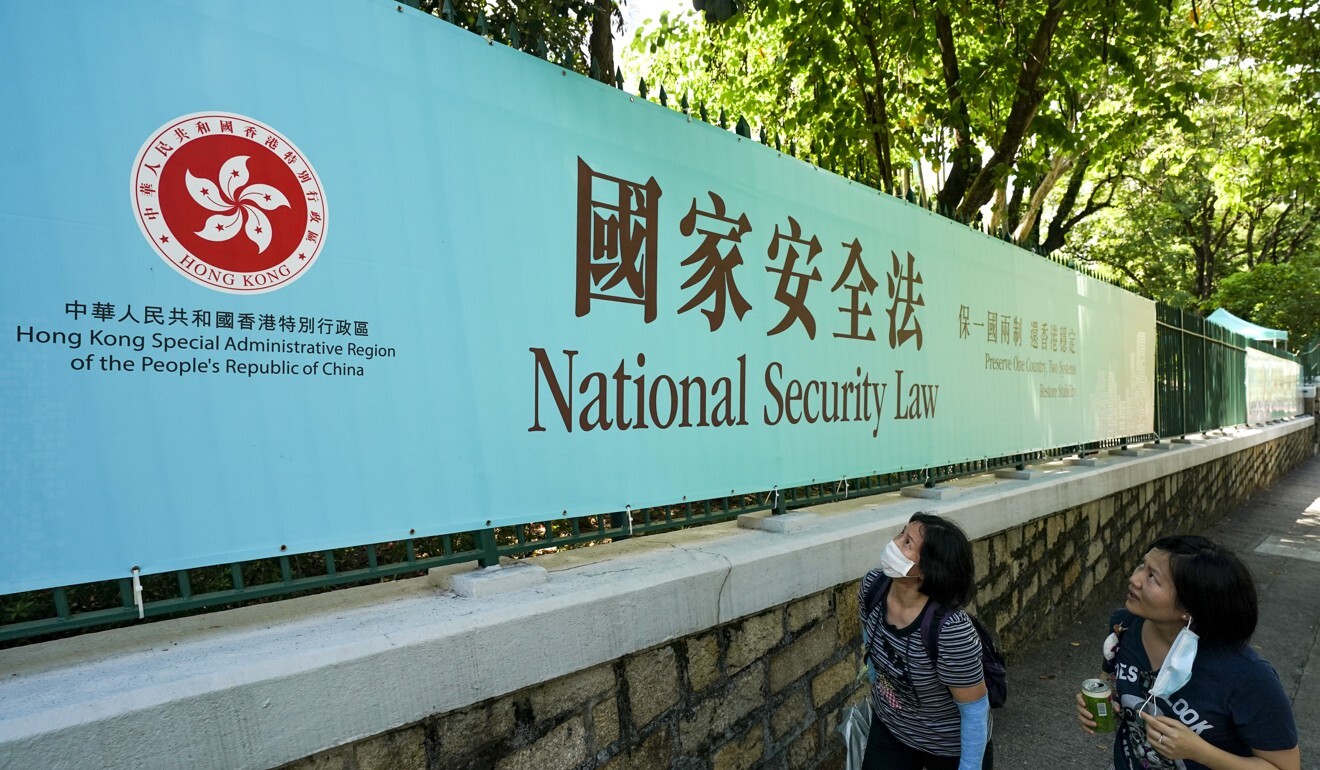
Explainer | BN(O) ticket: Britain opens doors to Hong Kong residents, but not everyone can walk in, and it’s not cost-free
- Hong Kong and Beijing have declared they will no longer recognise BN(O) passports, as war of words between China and Britain rages
- Row centres on pathway to citizenship offered by London through special visa scheme for Hongkongers with BN(O) status
From Sunday, Hong Kong residents considering moving to Britain can start applying for a special visa that opens a new pathway to immigration and citizenship there.
Some Hongkongers have already moved, while others are reported to have sold their homes in the city as they prepare to take up the British government’s offer.
The Post looks at the key issues for those contemplating moving to Britain, including various charges imposed, and possible retaliation by Beijing, as well as the consequences of the local and state governments’ announcements.

06:15
BN(O) passport holders flee Hong Kong for new life in the UK, fearing Beijing’s tightening control
What is Britain offering Hongkongers?
Britain granted BN(O) status to 3.4 million Hong Kong residents born before the 1997 handover, when the city returned to Chinese rule.
Their BN(O) passports allowed them to visit Britain for up to six months, but did not automatically allow them to work there. About 2.9 million of those people are still around, according to the British government estimates.
Last July, after Beijing imposed the national security law on Hong Kong, Britain announced the new BN(O) visa scheme.
From 5pm on Sunday, all Hong Kong residents with BN(O) status and their immediate family members can apply for the new visa that will allow them to live and work in Britain and, after six years, apply for citizenship.
BN(O) visa to allow staggered arrivals of successful Hong Kong family applicants
Why is Britain doing this?
Like several other Western nations, Britain has criticised the national security law as proof of Beijing’s tightening grip over Hong Kong.
The British government also says the implementation of the law constitutes a breach of the 1984 Sino-British Joint Declaration that enshrined the “one country, two systems” principle for Hong Kong, promising the city a high degree of autonomy for 50 years following the handover.
Beijing has reacted angrily to the British move, saying China would uphold its sovereignty and security, and was well within its rights to implement the national security law.
On Thursday, China’s foreign ministry spokesman Zhao Lijian accused Britain of “obstinately and repeatedly hyping up the BN(O) passport issue to interfere in Hong Kong affairs and China’s internal affairs” and warned that this would only hurt Britain’s interests.
China earlier accused Britain of breaching the joint declaration by effectively conferring the right of abode on those with BN(O) status. Rejecting that, the British government has said the right to stay in the country is not automatic and only granted after a standard, lengthy application process.
Boost for Britain, blow to Hong Kong? How the BN(O) ticket may affect fortunes
Who can apply for the BN(O) visa?
An estimated 5.4 million people out of Hong Kong’s population of 7.5 million are estimated to be eligible.
First, there are those with BN(O) status. The British government says it does not matter if Hongkongers have lost their BN(O) passports or allowed them to expire. They can check their status with British authorities.
If successful in proving their status, they and their dependants will be eligible for the BN(O) visa. Eligible dependants include spouses, civil or unmarried partners, and children under 18, none of whom need to have BN(O) status themselves.
Britain has said it may also grant the visa to children over 18 not ordinarily considered dependants in “compelling and compassionate circumstances”. Other family members such as parents, grandparents, and siblings may be considered on a case-by-case basis.
Successful applicants will be allowed to stagger their arrivals, so that one parent can remain in Hong Kong to work, while the other goes to Britain with their dependants.

Can any Hongkonger walk into Britain?
There are no job, skill or English-language requirements. Aside from showing proof of identity, BN(O) status and current residency in Hong Kong, applicants must provide a tuberculosis test certificate from an approved clinic.
However, they must show proof, including bank statements, that they can support themselves and their family members financially for at least six months.
They must disclose any prior convictions. British authorities will then run their own criminal and character checks, although immigration lawyers say those with “adverse histories” will not necessarily be disqualified.
Those who lodge applications between January 31 and February 22 will have to submit their fingerprints at the UK Visa Application Centre in North Point. From February 23, the whole application process can be done online.
The Hong Kong families struggling to decide whether to leave for Britain
What are the costs for BN(O) visa holders?
There are various charges, and they do add up. A family of two adults and two children under 18 will have to pay a total of £11,940 (US$16,375) to be in Britain for five years, with access to the National Health Service (NHS).
Those granted a BN(O) visa are permitted to live, work and study in Britain for five years as temporary residents with “leave to remain” status. They can apply for 30 months’ leave and extend it later, or apply for the full five years from the start.
The visa application fee for 30 months’ leave is £180 per person, while five years’ leave costs £250 per person.
Visa holders will have access to the NHS, but must pay an Immigration Health Surcharge (IHS) upfront. This fee is £1,560 for an adult applying for 30 months’ leave, and £3,120 for five years’ leave. Children pay around 25 per cent less.
So an adult applying for 30 months’ leave must pay a total of £1,740 and for five years’ leave, £3,370.
What about access to schools and property?
BN(O) visa holders are allowed to enrol their children under 18 in free public schools, and those over that age can apply for higher education courses.
However, they will not have access to other public funds during their first five years. These include social welfare benefits such as unemployment and housing subsidies. Earnings made in Britain will be subject to tax.
There are no legal restrictions on buying property, although those without a job may face more stringent requirements, including larger down payments when applying for a mortgage.

What are the steps to British citizenship?
After living in Britain for five years, BN(O) visa holders may apply for “indefinite leave to remain”. By then, they have to demonstrate English-language ability and pass a test on British society.
They also have to prove “continuous residency”, which means that for the first five years, they do not spend more than 180 days a year outside Britain.
If they clear this application for settlement, they will be allowed to remain indefinitely. Those who do not apply for settlement after five years, or are not granted it, will have to leave Britain.
After one year in settlement, they can apply for citizenship.
The application fee for settlement is £2,389 per person, and for citizenship, £1,206 for an adult.
Some people with BN(O) passports are already in Britain. How did they get there?
They have been granted “Leave Outside the Rules” (LOTR) by British immigration authorities at the border.
Before January 31, those who can demonstrate BN(O) status and financial independence can live in Britain for six months while they apply for the visa.
However, they do not have full access to the NHS during this period, and are advised to have full health insurance coverage.
Between last July 15 and January 13 this year, about 7,000 BN(O) status holders and their dependants were granted LOTR, according to British authorities.
How have Beijing and Hong Kong responded?
On Friday, Chinese foreign ministry spokesman Zhao Lijian announced Beijing would no longer recognise BN(O) passports as valid travel documents or forms of identification, saying Britain had ignored the fact that Hong Kong had already been returned to China for 24 years.
He said the BN(O) scheme was no longer one that had been agreed upon by both sides and would turn Hongkongers into “second-class citizens”, warning of further retaliatory measures to come.

Hours after Beijing’s announcement, the Hong Kong government said in a statement that BN(O) passports could not be used for immigration clearance or any form of proof of identity in the city from Sunday.
Residents may continue to use their Hong Kong permanent identity cards and HKSAR passports to enter or depart Hong Kong, and airlines must require passengers to present one of the two documents to board return flights, according to the statement.
It added that permanent Hong Kong residents who were not Chinese nationals and only held BN(O) passports could apply to the Immigration Department for identity documents to travel overseas.
Sources previously told the Post that Beijing had considered also barring those with BN(O) status from running for office or voting in Hong Kong.
Other possible measures include one proposed by former Hong Kong security chief Regina Ip Lau Suk-yee earlier this month, which would strip Hongkongers who acquire foreign citizenship of their right to both live and vote in the city.

What do the moves by Hong Kong and Beijing mean for me? Will I be able to return to Hong Kong if I don’t like it in Britain?
The latest actions would have little practical effect for those considering the BN(O) visa, said Kevin Bowers, a Hong Kong-based lawyer with Bowers Law who has been assisting residents making the move.
Given that most with BN(O) passports also had Hong Kong ID cards, they would still have the right of departure and re-entry, he said.
“The next step would be for Beijing to say – if you have a BN(O) passport, we won’t recognise your ID card. They need to do both of those things to stop people from returning to Hong Kong,” Bowers said.
This second step would be more akin to the proposal made by Regina Ip, he said, which was meant as a deterrent against Hongkongers taking up the visa.
“At this moment returning would be OK,” Bowers added. “But if what Regina Ip proposed comes into law, those people who take up the scheme could find themselves stuck.”

